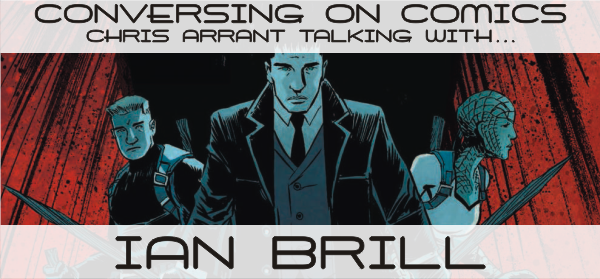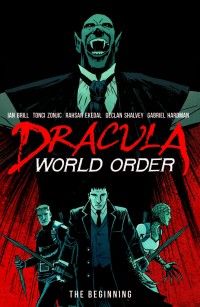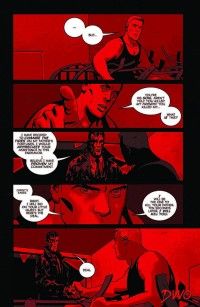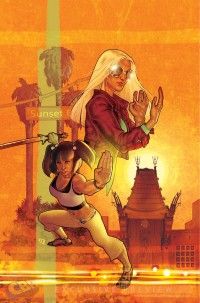Both Peter Parker and Clark Kent have managed to build a career as a comic book superhero on the back of a journalism career, and as it turns out so have a number of comic book writers. Following in the footsteps of Paul Levitz, Mark Waid and Neil Gaiman, Ian Brill first came into comics in the early 2000s as a journalist writing for the likes of Publishers Weekly and Newsarama. He went on to become an editor at BOOM! Studios, and parlayed that into his first major comics-writing gig, Darkwing Duck. That series succeeded past most anyone's expectations, and put Brill on a path to venture into comics writing full-time in 2011.
Earlier this summer, Brill launched the first major series of his own with the self-published Dracula World Order: The Beginning one-shot. Enlisting an all-star lineup of artists, Brill distributed the comic in grassroots fashion not unlike Sam Humphries' Our Love Is Real. Brill is already hard at work on more stories in the Dracula World Order universe, and he's also just been announced as the writer for the upcoming BOOM! series Freelancers, profiling a female duo of kung-fu bounty hunters. Comic Book Resources spoke at length with Brill about that series last month, so here we focus on his self-published work, his career trajectory and his thoughts on Kickstarter.
Chris Arrant: Ian, first question: what are you working on today?
Ian Brill: A few things. There will be more Dracula World Order, so I’m working on both more scripts as well as an overall long-term plan for the story. I’m also writing a series for BOOM! Studios called Freelancers, the story of two kung-fu bounty hunting young woman in Los Angeles, and it’s a lot of fun. In both cases I get to write the books I always wanted to read, whether that’s Dracula World Order, a horror comic that also deals in adventure and social/cultural issues, or Freelancers, an action comic with two very different but equally compelling female characters with personalities all their own. That’s the attraction of digging into these scripts every day. In addition there is more original work that I’m talking to artists about, different stories at different levels of development that I hope to get have for readers in the next year.
Some people may not fully realize the actual peculiarities of self-publishing. Do you have stacks of Dracula World Order in your house/apartment and you’re fulfilling orders and mailing them yourself there?
I've got some copies of the second printing left but luckily I’ve been able to clear most of that stock. It’s not as dramatic as when I first got the books from the printers and had big cardboard boxes stacked up in my apartment. I indeed do all the mailing myself. That's where self-publishing is the most dramatically different than just being a writer or an editor. It does take a deliberate switch in the brain to go from spending hours in your imagination to then go into strict business mode, viewing your book as itemized copies that are being sent across the nation.
I initially approached you before Dracula World Order was announced, wanting to do an interview about your comic book plans because we hadn’t seen much from you after Darkwing Duck and leaving your editorial position at BOOM! What have you been doing since then?
Working on Dracula World Order took up a lot of my time. It's designed to give the audience a lot of concepts and variety in a small and accessible package. Between the multifaceted content and going with a self-published model, I had an intense workload in front of me. It’s a lot of effort, but I’m happy to do it all to make this book a reality. Now the work is put towards continuing it. I’ve been lucky to have an artist (can’t announce whom yet, my apologies) working on me with new stories, and I’m looking at all the options available to get future stories out there.
If you could put a number on it, how much of your time, percentage-wise, for Dracula World Order was spent writing versus editing/publishing/licking stamps, etc?
It rises and falls. When I was scripting the book it loomed large. I have a day job in technical writing and I like to have a social life, but nevertheless I had long nights of marathon scripting. I did want to make sure I was the toughest boss I ever had. The word "scripting" even seems inadequate. In separate documents I was crafting this larger world that the book gives us just a glimpse of, and I even made concept sketches for the artists. So at the start I'd say 60-70 percent on weekdays, and 80-90 percent on weekends. When the script was in the hands of the artists I got a bit of a break, but even then I'm talking to printers, figuring out digital hosting, talking to retailers, and of course working with the artists and looking over their work (with everyone doing an amazing job). When I was distributing the book and promoting it, the work got back to the 60-70 percent range.
From a marketing perspective, Dracula World Order seems to be taking advantage of some recent trends in comics with a new kind of self-publishing model – boutique and digital. You know who and how to pitch comics to publishers, but why’d you decide to go your own way?
I like a challenge, and I feel struggle can yield great work. I knew that if I put my own time and finances on the line for this book I would be compelled to do as good a job as I can in terms of storytelling. I also wanted to see if I was just capable of doing this. I wanted to see if I could produce something for the marketplace where I employed all my skills as a writer, editor and businessperson. I love seeing people produce work independently, whether that's Jesse Thorn and his podcast empire at Maximum Fun, what Louis C.K. recently did with his last stand-up special, or what my friend Sam Humphries did with Our Love Is Real. I wanted to see if I could do more than just admire that type of work.
It seems pretty common these days for independent publishers to turn to Kickstarter to raise funds for this, but you chose not to. Can you talk about that decision to fund it yourself and not use Kickstarter?
I've been asked this a few times since the book has been has been put out there. The truth is, even though I have contributed to a few projects on Kickstarter, it never occurred to me to use the service for Dracula World Order. It's not immediate in my nature to ask for help, nor have I felt truly comfortable in promoting myself, which seems to be a major part of doing a project of Kickstarter. Of course once Dracula World Order arrived I had to go into promotion mode anyway but (and this is just my personal comfort level) I felt easier about it when the product was available to the audience for immediate purchase.
Getting into the mindset of self-promotion is still a challenge for me. One of the great things about the experience of Dracula World Order is facing that challenge. Modesty is a virtue, but as a wise man once said "shyness can stop you from doing all the things in life you'd like to." I have other projects in mind, and one in particular may lend itself well to a Kickstarter campaign, so that whole process is something I may still explore. One's career should be a constant evolution of thought.
It's hard for publishers to talk physical numbers, but I have to as a friend and a journalist/interviewer -- what are the sales like for Dracula World Order so far, both in print and digitally?
I can tell you that I set my expectations at a certain level (on both print and digital), and I have been humbled to see a response that exceeds those expectations. In terms of actual number I can divulge, I can tell you that the first printing of the book was 300, and orders have gone well past that, which has led me to a second printing. I'm not in a place right now where I can talk about the numbers from digital sales like I can with print (for one, there are not pre-orders that you fulfill in digital, so calculating numbers has a whole different timetable), but I can say that having the book available at comiXology has seen an incredibly positive reception.
I first met you back when you were a journalist writing about comics for Newsarama and Publishers Weekly. You went on to be an editor, a comics writer and now a writer/publisher/PR person of sorts. How’d you end up in this position?
It's been a journey that comes from a deep love of comics. My journey has bent towards me telling my own stories. It could be no other way. My mind is constantly hatching story ideas that I must communicate with the world, else I become haunted by the ghosts of "shoulda" "coulda" and "woulda." Even as a kid I would be writing and sketching ideas almost as a compulsion. Comics is the best medium for me to direct this creativity. That's why I have been so happy to work hard in all different roles in the medium, in what I see now has been a constant education.
Like some sort of comics butterfly, is comics writer your final stage of transformation or are you leaving open the option of transforming into something else?
I don't believe in being too calculating with one's profession, because so much of it is reacting to chance situations you could never think of. Telling stories is the most satisfying work for me, and I am incredibly grateful and aware of how lucky I am that I get to do it. Any work that allows me to do this wonderful alchemy is always work I'm happy to do. I start from there and then take on what life throws at me. Who knows where that leads?
Heck with the transitions -- next week Chris Arrant has secured an interview with master artist Steve Rude to talk about the return of Nexus at Dark Horse, his feelings on art and creator-owned comics, and his upcoming documentary.




